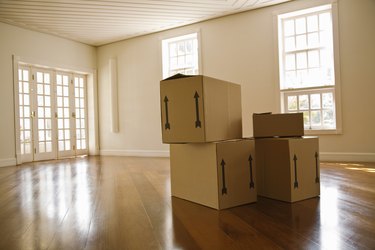
Engineered wood flooring and porcelain floor tiles are both attractive and durable materials. Each has strengths and weaknesses that make them suitable for very different applications. Understanding the nature of of both engineered wood and porcelain tile, as well as their limitations, will make the choice between them easier to make.
Engineered Wood Flooring
Video of the Day
Engineered wood flooring is made from three to five layers of hardwood veneer glued together. It is a natural wood product and shouldn't be confused with laminate flooring, a synthetic product made to look like real wood. The veneers in engineered wood flooring are laid in alternating directions so the wood's tendency to expand and contract with changes in humidity is counterbalanced between layers, making the material more dimensionally stable than solid hardwood. Engineered flooring is available in a variety of widths and finishes.
Video of the Day
Porcelain Floor Tiles
Porcelain is a type of ceramic material that is harder and more dense than other types of ceramics. All ceramic tiles are made from clay that is formed and then baked in a kiln at high temperature, resulting in a material that is hard and resistant to wear. Porcelain tiles are made from fine-textured porcelain clay and fired at a much higher temperature than other clays. The finished product has a tougher and less porous surface than other ceramics.
Advantages of Engineered Wood
Because of its dimensional stability, engineered wood flooring can be installed on almost any floor, even on a concrete slab, an unstable surface that is not suitable for a solid hardwood floor. Porcelain tile is best installed on a slab because movement and flexing of the floor can result in cracked tiles or disintegrating grout between the tiles. Due to its greater weight, porcelain is even more susceptible to this kind of damage than other types of ceramic tile.
Advantages of Porcelain
Porcelain tiles are extremely durable, and their hard surface is resistant to scratches and scrapes. Wood floors scratch relatively easily, and the thin surface veneer of some engineered flooring materials makes refinishing them difficult or impossible. If extra tiles are on hand, broken tiles are relatively easy to replace. Ceramic tiles, especially porcelain, are resistant to water and are well suited to installation in wet areas of the home, while wood floors are vulnerable to water damage.